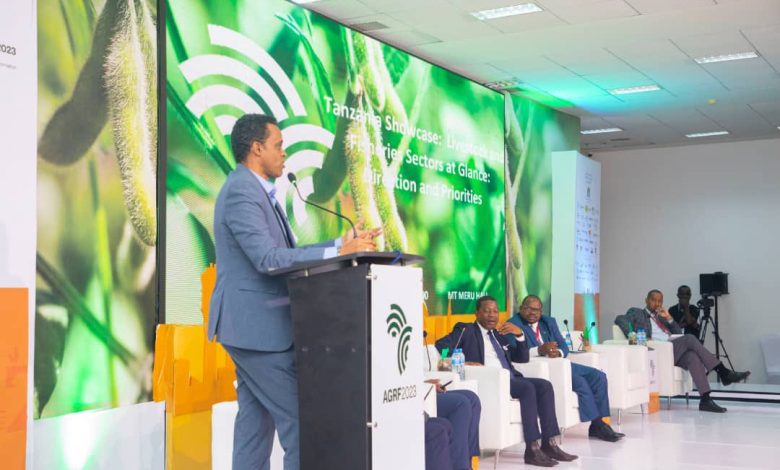Tanzanian Avocados Hailed as the Best in the World: U.S. Ambassador Lauds the Nation’s Agricultural Success at the Launch of USAID’s ‘Let’s Save Food’ Project
HAI, KILIMANJARO –
By Anthony John
In a powerful address that underscored Tanzania’s emergence as a key player in global agriculture, U.S. Ambassador Michael Battle praised the exceptional quality of Tanzanian avocados during the launch of USAID’s Feed the Future Tanzania Tuhifadhi Chakula (Let’s Save Food) Project on September 26, 2027. The event, hosted in Hai, Kilimanjaro, drew government officials, agricultural leaders, farmers, and international partners together in a concerted effort to combat post-harvest food loss and strengthen Tanzania’s agricultural value chains.
Speaking with palpable enthusiasm, Ambassador Battle declared, “The best avocados on the planet are grown in Tanzania,” setting a bold tone that could elevate Tanzania’s standing in the lucrative global avocado market. He stressed the need for reliable supply chains that allow Tanzanian avocados to reach consumers in the United States and beyond throughout the year. “I want those avocados all year round—not just in the summer and spring in the U.S., but in the fall and winter. And the only way I can get avocados in the fall and winter is if we get them from Tanzania. So, let’s make it happen.”
This endorsement is not just praise—it signals a strategic opportunity for Tanzanian farmers and exporters to seize a greater share of the global market, where demand for avocados continues to soar. With Tanzanian avocados already celebrated for their taste and quality, this spotlight positions the country to become a year-round supplier to major markets like the U.S., Europe, and Asia.
A Decade of Transformative Investment
Ambassador Battle’s speech also highlighted the broader impact of U.S. support for Tanzania’s agricultural sector. Over the past decade, the United States has invested over 400 million USD in initiatives aimed at bolstering food security, economic growth, and rural development across the country. The newly launched Tuhifadhi Chakula Project is the latest addition to these efforts, focusing on minimizing post-harvest losses, improving food storage and processing, and ensuring that more Tanzanian families have access to quality food.
The event was graced by Deputy Minister for Agriculture, Hon. David Silinde, and Hai District Commissioner Lazaro Twange, who reiterated the Tanzanian government’s commitment to modernizing agriculture and enhancing food security. They praised the project’s holistic approach, which brings together smallholder farmers, agribusinesses, and policymakers to address the pressing issue of post-harvest losses.
Farmers at the Forefront of Progress
In his remarks, Ambassador Battle made it clear that the success of Tanzania’s agriculture hinges on the resilience and ingenuity of its farmers. He singled out Samuel , a local farmer whose income surged from 6 million to over 26 million Tanzanian shillings after adopting improved agricultural practices and technologies. “This shows you what happens when you have the right kind of seed, the right kind of irrigation, the right kind of technology, and the right kind of market,” the ambassador said, demonstrating how strategic support can transform smallholder farming into a thriving business.
Over the last four years, more than 2 million Tanzanians have benefited directly from U.S. government-supported food security programs, unlocking over 4.8 billion USD in agricultural financing. Ambassador Battle emphasized that these gains were not just financial—they were investments in people, communities, and the future of Tanzania. “The future belongs to the farmers. The future belongs to your ability to do well,” he said, addressing the gathered farmers with deep respect and appreciation.
Public-Private Partnerships: The Way Forward
Ambassador Battle underscored the crucial role of public-private partnerships in driving Tanzania’s agricultural transformation. USAID’s initial investment of 2 million USD in the Tuhifadhi Chakula Project is expected to leverage an additional 18 million USD from the private sector, creating a 20-million-dollar opportunity to combat food loss and waste. “The way to future success is through public-private partnerships that build upon the expertise of the private sector and the ingenuity and willingness of the government to work exceedingly hard,” he stated.
He also acknowledged the presence of representatives from the South Korean government, highlighting a new collaboration between the U.S., South Korea, and Tanzania that will expand cold storage and food processing capabilities—key areas for reducing food loss and enhancing the profitability of Tanzanian produce.
Accelerating Tanzania’s Agricultural Growth
Tanzania’s inclusion as one of three African nations in the U.S. government’s accelerated Feed the Future initiative, alongside Malawi and Zambia, reflects its growing stature as a regional agricultural leader. “Tanzania has the insight, the willingness, and the ability to do exceedingly well,” Ambassador Battle affirmed, noting that the country’s young and dynamic population is at the forefront of creating innovative solutions to meet local and regional food needs.
The ambassador also recognized the Tanzania Horticultural Association (TAHA) as a key partner, whose efforts have shown that with the right investments, Tanzania’s agricultural potential is boundless. “There is no stop to the possibilities that can be achieved,” he said.
A Vision for the Future
As the event drew to a close, Ambassador Battle’s message was clear: Tanzania’s agricultural future is bright, and the country’s farmers are the backbone of that progress. “We all depend upon you. Without you, none of us would be fed. Without you, none of us would be healthy,” he told the assembled farmers.
